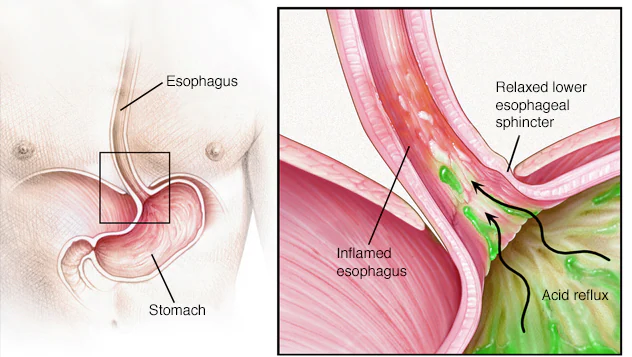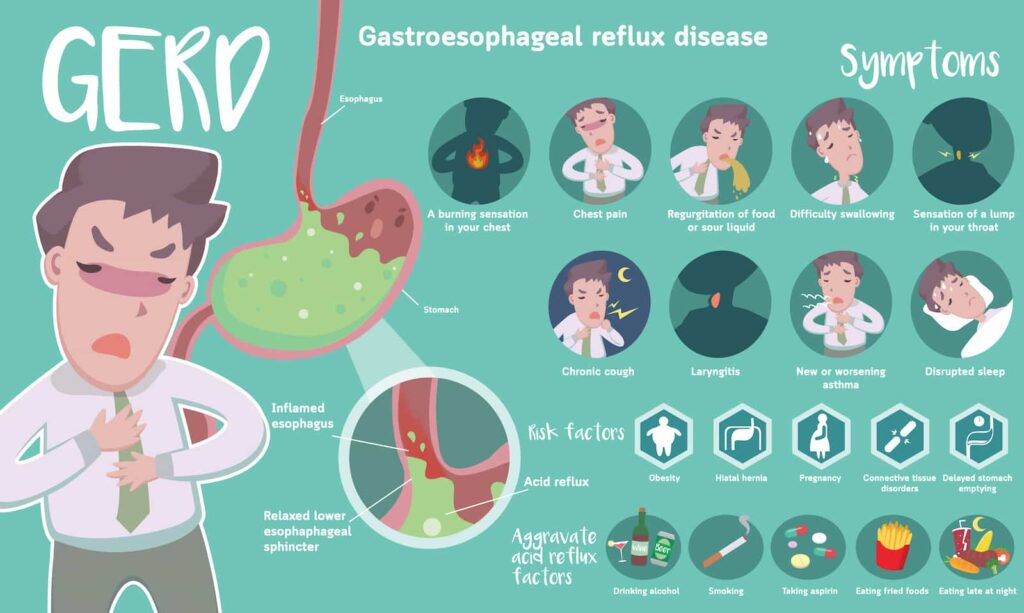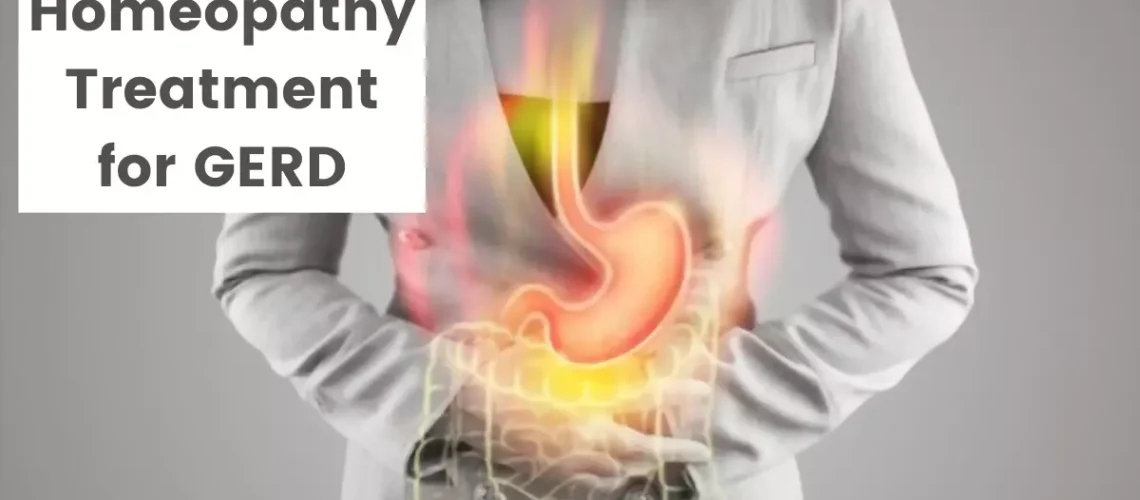This blog covers the GERD disease homeopathic treatment, its symptoms, causes, risk factors, management & medicines. Many people have experienced gerd at some point in their lives a searing, sometimes sour-testing chest spasm.
This experience is called heartburn and when this happens for more than two weeks regularly, then this condition is diagnosed as Gastro-esophageal reflux disease or GERD.
It has become a very common digestive issue worldwide and people are battling to get rid of it.
This article will cover homeopathic remedies for GERD, causes of GERD, symptoms, risk factors, management & complete treatment.
Table of Contents
ToggleWhat is GERD?
GERD or Gastroesophageal reflux disease is one of the most common gastric disorders. It is a condition in which the acids or the contents from the stomach go up into the esophagus or food pipe and cause an uncomfortable sensation in the throat.
It is also known as acid reflux or heartburn.
At the entrance to our stomach, there is a valve, which is a ring of muscles called the lower esophageal sphincter or LES. Normally the LES closes as soon as food passes through it. If the LES doesn’t close all the way or if it opens too often, acid produced by our stomach can move up into the esophagus.
This can cause symptoms such as a burning chest discomfort called heartburn and when this condition occurs more than two weeks it is referred to as GERD or Gastro-esophageal reflux disease.
Over time, it makes the esophagus narrow and can cause swallowing difficulties and without appropriate treatment, a patient may develop ulcers in their esophagus.

Causes of GERD
GERD is the most common gastric problem and one of the most common causes of this problem is eating a large meal and lying down after eating a meal. It will allow the reflux of acid and even the chunks of food to spurt from the stomach to the food pipe.
Food like peppermint and caffeine contain ingredients that may have a relaxing effect on the lower esophageal sphincter or LES which makes it incapable of doing its job.
Other acidic foods like citrus and tomatoes, can worsen irritation of the esophagus when they come in contact with stomach acid.
Carbonated beverages like cold drinks and soda similarly bubble up in the stomach, forcing open the valve.
Smoking can also cause GERD because the nicotine in cigarettes can relax the LES.
Obesity or overweight condition can cause a hernia that disrupts the anti-reflux barrier of the gastro-esophageal junction.
Consuming an excessive amount of alcohol may have a similar effect as nicotine in cigarettes that relaxes the lower esophageal sphincter.
Stages of Gastro-esophageal reflux disease
1. Mild
This is the initial stage of Gastro-esophageal reflux disease. In this stage of GERD, the esophagus is mildly inflamed.
The symptoms include heartburn, pain in the chest, and regurgitation of food or liquid.
2. Moderate
If the symptoms of Gerd happen multiple times in a week then this condition will come under the stage second that is moderate.
The symptoms include frequent regurgitation resulting in more irritation and inflammation in your esophagus.
3. Severe
This stage of Gerd presents a more severe and significant problem both in the symptoms of acid reflux and inflammation of the esophagus.
Approximately 15% of people who have GERD are in stage 3 and experience symptoms that are severe and occur two or more two times a week.
4. Esophageal cancer or Precancerous lesion
This stage of GERD represents the most serious consequences of long-term acid reflux.
If GERD is left untreated or remains uncontrolled then it can lead to some serious complications such as esophageal stricture, Barrett’s esophagus, and esophageal cancer.
Symptoms of GERD
The symptoms of GERD can range from mild to severe. The symptoms are as follow:
- Burning sensation in the chest
- Regurgitation of food or sour liquid
- Chest pain
- Pain in the center of the abdomen
- Bitter or acidic taste in the mouth
- Tingling sensation in the throat
- Burning sensation in the food pipe
- Dysphagia or difficulty in swallowing
- Feeling that food stuck in the chest.
- A sensation of a lump in the throat
- Choking
- Chronic Coughing
- Hoarseness
- Frequent burping
- Disrupted sleep

Risk factors of GERD
The acid reflux or heartburn infection if left untreated can lead to some serious complications like ulcers and gastroesophageal cancer. As the condition progresses the acid released from the stomach can damage the lining of the esophagus gets, leading to severe health risks.
The risk factors include-
Being obese or overweight is a major risk factor for developing Gastro-esophageal reflux disease. It can lead to various complications like esophagitis (inflammation of the esophagus) and esophageal adenocarcinoma (cancer of the esophagus).
Pregnancy is another risk factor for GERD, as it causes many changes in the body such as weight gain. An increase in weight and growth of the fetus applies pressure on the stomach resulting to cause reflux of acid from the stomach to the esophagus.
Exposure to cigarette smoke can cause GERD. The nicotine content in cigarettes can relax the lower esophageal sphincter of the esophagus which further leads to cause the reflux of acid into the food pipe.
Some anatomical conditions such as hiatal hernia can also cause GERD. It is a condition when your stomach protrudes through your diaphragm and into your chest, which can cause to force the stomach content to back up into the esophagus and cause GERD.
Certain medications and supplements like painkillers anti-depressants can cause GERD.
Some diseases like Diabetes, Asthma, and patients with connective tissue disorders are also linked with developing GERD.
Diagnosis of GERD
Diagnosis of GERD is based on the physical examination and history of signs and symptoms of the patient.
In making a diagnosis the doctor will review the medical history of the patient to identify any factors that cause GERD, such as obesity, the habit of smoking and alcohol, and any history of diseases that can cause GERD.
Most cases of GERD are diagnosed based on clinical symptoms only. To confirm the diagnosis, your doctor will perform certain invasive tests.
To examine the inside of the esophagus and stomach, the doctor inserts a thin, flexible tube having light and a camera in one end into the throat. This equipment is called endoscopy the procedure is known as endoscopy.
By endoscopy, the doctor can detect any inflammation of the esophagus or other complications.
If the patient complains of frequent regurgitation of food or liquid then another test is done called the Ambulatory acid ph probe test. This test is done to check and identify for how long the acid regurgitates in the esophagus.
Another diagnosis includes an X-Ray of the upper digestive system, to check the narrowing or inflammation of the esophagus.
Prevention and Management of GERD
It is sage advice that prevention is better than cure. Lifestyle changes and modifications by avoiding those habits that promote acid reflux can prevent GERD.
Certain foods compromise the lower esophageal sphincter’s ability to prevent reflux and are best avoided. This may differ from person to person but it is usually noted that foods like spicy, fried, and fatty foods, onions, citrus fruits, and beverages like coffee, tea, alcohol cause the most trouble.
Certain types of foods are very helpful to reduce the symptoms of GERD. These foods include curd and yogurt, ginger, oats, green leafy vegetables, and fruits like watermelon and papaya. So, try to include these foods more often in your diet.
Do not go to bed with a full stomach and stroll at least 30 minutes after dinner before going to bed.
Eat meals at least 2-3 hours before lying down. This will give the food the time to digest and get out of your stomach.
Do not overeat. Eat smaller portions at mealtime and try to eat four to five small meals instead of three big ones.
Maintain a healthy weight. Obesity can put pressure on your abdomen, pushing up your stomach and causing heartburn or acid reflux.
Avoid tight-fit clothes that fit tightly around your waist put pressure on your abdomen and the lower esophageal sphincter.
Stop smoking, it will decrease the lower esophageal sphincter ability to function properly and also leads to excessive secretion of acid in your stomach.
GERD Disease Homeopathic Treatment – Best Medicines
Homeopathy is a holistic system of medicine that treats not only the symptoms of the disease but also the man who is suffering from the disease.
So, after a complete detailed history of present and past disease and considering the family history also, a drug is prescribed which will be based on individualization of every patient.
The duration of treatment will vary from person to person and depend upon the severity of the acid reflux.
In mild cases, improvement can be seen in 4-5 weeks, whereas severe cases will take a longer time.
Now, let’s go through some of the homeopathic medicines that can help to treat GERD.
Some of the best homeopathic medicines for the treatment of GERD are mentioned below.
- Arsenicum Album
- Calcarea carbonicum
- Carbo Veg
- Iris Versicolour
- Robinia Pseudocacia
- Natrum Phos
- Phosphorus
- Nux vomica
- Pulsatilla Nigricans
- Sulphuric acid
1. ARSENIC ALBUM: for burning pain in the throat
Burning in the throat is one of the major symptoms of GERD and Arsenic album in indicated in such condition.
Arsenic is suitable for cases where the burning is better by taking sips of warm water.
The patient has restlessness and aggravation of symptoms at the midnight.
Dosage and potency: 30c, 200c 4 globules (pills) dissolved in half cup of water 3 times a day.
2. CALCAREA CARB: for sour taste in the mouth
Acid reflux from the stomach to the esophagus often follows with the flow of sour, watery fluid from the mouth.
Calcarea carb is indicated when there is a sour taste in the mouth and foul odor from the mouth may also present with nausea.
The patient also experiences continued loud belching after eating, with cough and nausea.
Dosage and potency: 200c, 4 globes in half cup of water thrice a day till the symptom disappear.
3. CARBO VEG: for heartburn and excessive flatulence
It is a wonderful remedy for the treatment of GERD and is indicated when there is heartburn, bloating with excessive flatulence.
Carbo veg is indicated when there is sour, offensive belching that gets worse after eating or drinking.
Even the simplest of food tends to trigger the condition.
Dosage and potency: 30c, 200c, take 4 drops of dilution in half cup of water twice a day, till the improvement is seen.
4. IRIS VERSICOLOR: for sour, bitter belching
It is an effective remedy for the treatment of many digestive-related issues including GERD.
Iris versicolor is indicated when there is a burning sensation in the chest with nausea and excessive salivation along with sour belching.
Despite this, it is also used as a laxative to relieve fluid retention and bloating.
Dosage and potency: 200c potency take 4 globules (pills) twice a day till the improvement occurs.
5. ROBINIA: for heartburn and acidity
Robinia is one of the top listed medicines for treating GERD.
It is indicated when there is an intense burning sensation in the chest, constant sour belching and sour vomiting due to acid reflux, and regurgitation of food or liquid from the stomach.
The symptoms get worse at night after lying down. Acidity is so intense that it can cause sleeplessness also.
Dosage and potency: 200c potency of dilution, take 2-3 drops in half cup of water twice a day, till the symptoms disappear.
6. NATRUM PHOS: for difficult swallowing
Natrum Phos is another wonderful remedy for acidity and GERD. It is indicated when heartburn is attended with dysphagia that is difficulty in swallowing.
There is loss of appetite and vomiting of sour, cheesy curdled matter or belching of sour fluid.
A sensation of limp in the throat may also be present.
Dosage and potency: 30c, 200c potency, take 2-3 drips of dilution in half cup of water and take twice a day till the improvement.
7. PHOSPHORUS: for acid reflux with hoarseness
Phosphorus is indicated when there is racking cough, sore throat, and hoarseness of voice along with regurgitation.
Hoarseness may be worse during the evening.
It is also indicated in many gastric problems such as burning in the stomach and chest, sour belching, and vomiting of food or sour liquid.
It is indicated when ice and cold water seem to give immediate relief from acidity.
Dosage and potency: 30c, 200c, 4 globules (pills) twice a day till the improvement is seen.
8. NUX VOMICA: for heartburn due to beer, caffeine, and spices
Nux vomica is an effective medicine for the treatment of GERD and gastric issues.
It is indicated when there is heartburn caused by beer, caffeine, or spices.
The patient complain of a burning sensation in the chest and upper abdomen along with increased acidity
Dosage and potency:- 200c potency, take 4 globules thrice a day up to improvement.
9. PULSATILLA: for heartburn due to oily food
Pulsatilla is a highly indicated medicine that provides a perfect solution for heartburns caused by oily, fried, or fatty foods like cream, pastry, and ice-creams. Such foods trigger acid reflux and cause heartburn.
The patient may also suffer from nausea and vomiting that contains acidic, bitter, and greenish-colored contents.
Dosage and potency: 30c, 200c take 3-4 drops of dilution in half cup of water twice a day.
10. SULPHURIC ACID: for acid reflux with sour belching
It is useful in treating heartburn after eating and also used to treat the symptoms associated with inflammation in the chest, sour taste in the mouth, and belching.
Dosage and potency: 200c potency, take four globules under the tongue, twice a day for 15 days or until the improvement appears.
Remember that homeopathic remedies are prescribed based on individual symptoms and characteristics. It’s crucial to consult with a qualified homeopath for proper evaluation and personalized treatment. Homeopathy focuses on treating the whole person, so a detailed case study is necessary to select the most appropriate remedy.
Homeopathic medicines should be taken only when prescribed by a homeopathic physician. Self-medication may aggravate the original conditions.

